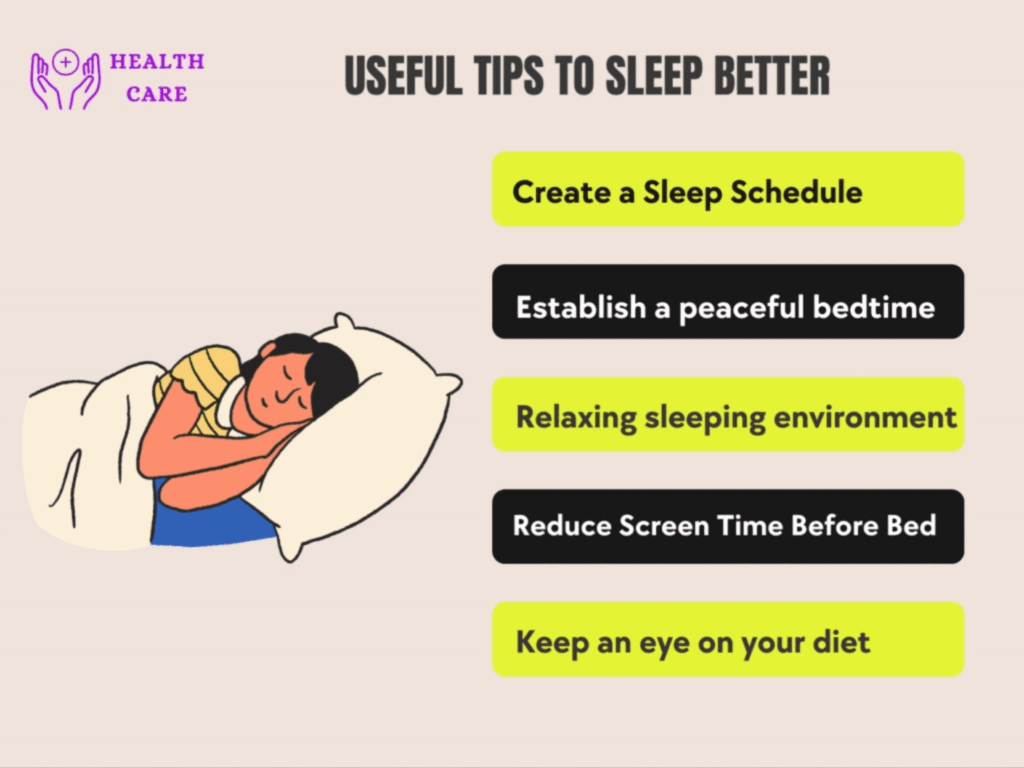Are you sick of having sleepless nights and alternating back and forth in bed all day? Do you frequently feel sleepy and unrefreshed when you awaken? If so, you are not alone. Sleep directly impacts our physical and mental health, which is a crucial aspect of our existence.
Thankfully, there are several techniques you can use to improve the quality of your sleep and awaken feeling refreshed. The following article will discuss 10 useful tips to sleep better.
We will explore various strategies that can significantly improve the quality of your sleep, such as setting a relaxing nighttime ritual and sticking to a regular sleep schedule.
You’ll discover how crucial it is to create a relaxing sleeping environment, limit your exposure to devices and artificial light, and even how your food choices may affect your sleep patterns.

No matter your present routines and habits, by the time you’re done reading, you’ll have a thorough grasp of how to enhance your sleep.
Say goodbye to restless nights and hello to the advantages of being energized, focused, and well-rested. So, let’s dive into these 10 great suggestions for improved sleep and set off on a path to a more energized and healthy existence.
1. Create a Regular Sleep Schedule: Useful Tips to Sleep Better
One of the most important guidelines for enhancing sleep quality is to maintain a consistent sleep pattern. Our bodies contain a 24-hour internal clock called the circadian rhythm that controls some physiological and behavioral functions, including sleep.
“The regularity and quality of your sleep may be greatly improved by going to bed and getting up at the same time every day, which assists in synchronizing your sleep pattern with your internal clock”.
Your body becomes accustomed to the pattern when you stick to a regular sleep schedule, which makes it simpler for you to go to sleep and wake up when you want to. This is because, in advance of your usual bedtime, your body starts to generate sleep-inducing chemicals like melatonin.
The various sleep phases, including deep sleep and REM (rapid eye movement) sleep, which are critical for feeling rested and aware during the day, are also optimized by regular sleep patterns.
On the other side, irregular sleep patterns can mess with your circadian cycle and make it difficult for you to go to sleep at night or wake up in the morning.
It can cause drowsiness, diminished cognitive ability, and an increased risk of sleep problems. Setting up a regular sleep routine needs to be your first concern if you want to enhance the quality of your sleep.
2. Establish a peaceful bedtime routine
Your body and mind need to be relaxed before bed to have a good night’s sleep. Establishing a peaceful bedtime routine is a Useful Tips to Sleep Better. A sequence of relaxing exercises is included in this routine, which you perform just before bed to wind down and tell your body it’s time to sleep.
For instance, reading is a great way to unwind your thoughts. It aids in helping you change your attention from the tensions and worries of the day.
- The rise in body temperature followed by a time of cooling off after a warm bath or shower might mirror the body’s normal temperature decrease that happens before sleep begins.
- Deep breathing, progressive muscle relaxation, and meditation are relaxation techniques that can help you go to sleep by calming your mind and reducing tension and worry.
- By lowering your heart rate and easing muscular tension, these approaches help your body get ready for sleep.
3. Establish a relaxing sleeping environment. Useful Tips to Sleep Better
For a restful night’s sleep, a cozy sleeping space is essential. It entails enhancing your bedroom to encourage a tranquil environment. Make sure your room is dark, quiet, and chilly before anything else.
Use eye masks or blackout curtains to block off light and think about using earplugs or a white noise machine to lessen distracting noises. The ideal sleeping environment for most individuals is a cold room that is between 60- and 67-degrees Fahrenheit (15 and 20 degrees Celsius).
“A comfy mattress and pillows should also be purchased. Your head and neck should be supported by your pillows, and your mattress should be comfortable and supportive enough”.
To provide maximum comfort, the selection of bedding, including sheets and blankets, should be based on personal tastes. To train your mind to identify the bedroom with sleep, keep it clutter-free and only use it for intimacy and sleep.
Also Read:-
- 5 key steps to improve your mental health
- 5 key steps to improve your mental health
- How to Get Rid of Body Pain Naturally: A Comprehensive Guide
4. Reduce Screen Time Before Bed
The blue light that electronic gadgets generate might cause your sleep patterns to be disturbed if you use them right before bed. It is a Useful Tips to Sleep Better. Your body’s ability to produce melatonin, a hormone that controls sleep, is hampered by this light.
It is advised to minimize screen usage at least an hour before bedtime to help reduce this. Instead of using screens to relax, think about doing something physical, like reading a book or taking a warm bath, to help your body get ready for sleep.
- If you must use a screen, think about switching to “night mode” or downloading applications that cut down on blue light emissions. These changes can lessen the negative effects of screens on your sleep.
- For those who struggle with insomnia or difficulty falling asleep, avoiding screens before bed is especially important since the blue light from screens can make it harder to wind down and relax, inhibiting the body’s natural transition into a comfortable night’s sleep.
5. Keep an eye on your diet. Useful Tips to Sleep Better
How well you sleep is greatly influenced by your food. Large, hefty meals should be avoided right before night since they can cause pain and indigestion, which makes it more difficult to fall asleep. In this respect, meals that are high in fat, spicy, or acidic can be particularly harmful.
Late-day use of alcohol and caffeine can also interfere with your ability to sleep. Several hours might pass between the effects of caffeine, a stimulant found in coffee, tea, and some soft beverages.
Alcohol can cause sleep patterns to become disturbed and increase the number of nighttime awakenings, even if it initially makes you feel sleepy. It’s recommended to have your final meal at least a few hours before bed and to select lighter, more readily absorbed meals to promote better sleep.
6. Get Regular Exercise
You may significantly improve your sleep quality by engaging in regular physical activity. Improved sleep may be a result of exercise’s ability to control your body’s circadian cycle. Additionally, it could make it easier for you to nod off and enhance the quality of your sleep and is a Useful Tip to Sleep Better.
But you must exercise at the right time Some people find that exercising too soon before bed might be detrimental since it stimulates both the body and the mind.
On most days, aim to work out for at least 30 minutes at a moderate level, but try to end your workout a few hours before bed to allow your body time to unwind. To encourage sound sleep, yoga, and relaxation techniques can be very helpful.
7. Reduce Stress – Useful Tips to Sleep Better
A restful night’s sleep depends on being able to manage your stress. High amounts of stress can cause a racing mind, which makes it difficult to unwind and go to sleep. Stress-reduction tactics must be included in your everyday routine to handle this.
For instance, meditation calls for clearing your mind of the constant stream of racing ideas. Yoga promotes relaxation by fusing physical postures with regulated breathing and concentration.
- To assist in relieving physical tension, progressive muscle relaxation involves tensing and then relaxing various muscle groups in the body.
- These techniques aid in relaxing your body and mind and promoting sleep by calming your nervous system, lowering the release of stress hormones, and reducing anxiety.
- It can also help to reduce tension and tell your body that it’s time to wind down for the night by establishing a relaxing bedtime habit, such as reading a book or taking a warm bath.
- The key to enhancing sleep and general well-being is reducing stress. Reducing stress is one of the best advantages of sleeping better and are useful tips for the same.
8. Take only short naps
Even though naps have the potential to be rejuvenating, if not carefully controlled, they might disrupt your nocturnal sleep.
Maintaining short naps at the proper times can help you reap the advantages of napping without jeopardizing your nightly sleep and a Useful Tips to Sleep Better. A fast 20 to 30-minute sleep will increase alertness without making you drowsy, give you an energy boost, and elevate your mood.
“Your nap’s timing is crucial. Too late afternoon or evening naps might mess with your body’s circadian cycles and make it hard to get to sleep at night. If you must nap, try to do it as early in the afternoon as possible, usually between 2 and 3 p.m. “
Because everyone has different demands for sleep, you should also think about how naps affect your sleep patterns.
It may be best to reduce your daytime naps and concentrate on improving the quality of your nighttime sleep through other sleep hygiene practices.
such as keeping a regular sleep schedule and developing a relaxing bedtime routine if you find that napping frequently makes it difficult for you to fall asleep at night.
9. Avoid watching the time – Useful Tips to Sleep Better
When attempting to get more rest, clock-watching might be a bad habit. People who have trouble going to sleep or who deal with insomnia frequently check the clock excessively, which can heighten anxiety and exacerbate the issue.
- Watching the minutes pass by can intensify emotions of annoyance and tension, starting a vicious cycle that makes it increasingly harder to fall asleep. It is one of the useful sleep tips better.
- If you have trouble falling asleep or wake up in the middle of the night and can’t get back to sleep, it’s advised that you avoid glancing at the time to break this pattern.
- Get out of bed instead, and until you feel tired, do something calm and unstimulating like reading a book or listening to relaxing music. It is possible to feel less anxious and increase your chances of falling asleep again. By getting rid of the continual reminder of how long you have been up.
10. Speak with a healthcare provider – Useful Tips to Sleep Better
It might be time to speak with a healthcare provider if you frequently have trouble sleeping despite your best attempts to improve your sleep hygiene. There are several useful tips to sleep better.
Several underlying diseases, sleep disorders, or mental health issues can all contribute to sleep problems. To identify the underlying reason and obtain the right care, you must seek expert advice.
“Any sleep problems including insomnia, sleep apnea, or restless leg syndrome can be evaluated and assessed by healthcare professionals. Like primary care doctors, sleep specialists, or mental health specialists”.
Additionally, they can provide you with individualized advice and care, which may involve counselling, medication, lifestyle adjustments, or other interventions catered to your particular need.
You may make substantial strides towards treating persistent sleep disorders and enhancing your general well-being by speaking with a healthcare expert. Always keep in mind that getting deep and restorative sleep frequently requires treating the underlying issue.
Conclusion
A restful night’s sleep is a rare commodity in our fast-paced society when many of us struggle to find a moment of calm. As the foundation of our physical and mental health, getting better sleep should be a primary goal. As we have seen 10 useful tips to sleep better.
A regular or useful way or tips to sleep better routine is first and foremost. Establish a bedtime and wake-up time to manage your internal clock since your body thrives on regularity.
- Making a comfy sleeping environment is also essential. Buy a good mattress, keep the room dark, quiet, and cool, and keep electronics out of the bedroom.
- Sleep quality is significantly influenced by diet. Eat foods that promote sleep, such as almonds, cherries, and chamomile tea, and stay away from caffeine, alcohol, and big meals just before bed.
- Regular exercise or these useful tips may also significantly improve your sleep patterns but avoid overdoing it right before bed.
- Deep breathing and mindfulness meditation are both effective stress-reduction practices that can help you sleep better. And also, useful tips for sleep better.
Prioritize relaxing before bed by reading a book, taking a warm bath, or doing some light stretching. These are the best and most useful tips for sleeping better.
Better sleep is a process, not a destination, keep that in mind. You may create the conditions for refreshing, peaceful evenings and enjoy a better, healthier life by incorporating these 10 Useful Tips to Sleep Better. Those who prioritize their sleep will have pleasant dreams.
FAQs – 10 useful tips to sleep better
Q1. What is the appropriate temperature of a bedroom for restful sleep?
- Choose a cool room—60–67°F (15–20°C) is ideal.
Q2. How can I set up a peaceful nighttime routine?
- Become more relaxed by reading or having a warm bath before bed. It is one of the best useful tips for sleeping better.
Q3. Limiting screen time before bed is a good idea?
- Yes, cut back on screen time at least an hour before bed.
Q4. Should I adhere to a regular sleep schedule?
- Yes, having a regular sleep schedule aids in preserving the body’s natural rhythm.
Q5. What function does exercise serve in enhancing sleep?
- Regular exercise can help you sleep better but try to avoid strenuous exercise just before bed. Ask for useful tips to sleep better with your doctor.
Q6. Is it alright to eat a little snack before going to bed?
- Yes, but avoid hefty or spicy foods, since these may interfere with sleep.
Q7. How can I lower my stress level to sleep better?
- Use relaxing methods like deep breathing or meditation. You can use these useful tips to sleep better.
Q8. Is it preferable to stay away from coffee and alcohol before bed?
- Yes, these drugs can disrupt sleep, so try to avoid using them right before bed.
Q9. What significance do a soft mattress and pillows have?
- For restful sleep, a comfortable sleeping surface is essential. Change any worn-out or uncomfortable bedding.
Q10. How can I deal with chronic sleep problems like insomnia?
- Consider seeking advice and treatment from a healthcare expert if you often have problems falling asleep.









